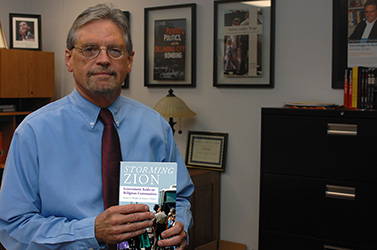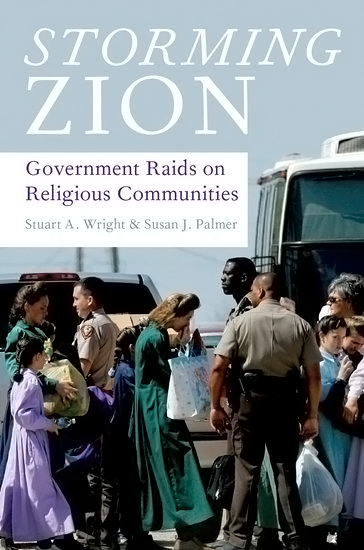Wright examines government raids in Storming Zion
 Stuart Wright and Susan Palmer have completed what they believe is the first comprehensive study ever conducted of government raids on religious communities — Storming Zion: Government Raids on Religious Communities, is the result of extensive research that took the two from Central and West Texas to the streets of Paris and Brussels to the most remote parts of the Alps and Pyrenees. Together, they recorded 116 raids. Along the way, they also talked to scholars, officials and leaders of watchdog groups.
Stuart Wright and Susan Palmer have completed what they believe is the first comprehensive study ever conducted of government raids on religious communities — Storming Zion: Government Raids on Religious Communities, is the result of extensive research that took the two from Central and West Texas to the streets of Paris and Brussels to the most remote parts of the Alps and Pyrenees. Together, they recorded 116 raids. Along the way, they also talked to scholars, officials and leaders of watchdog groups.
Storming Zion, published by Oxford University Press, is a study of contemporary raids on new or nontraditional religious communities in 17 countries, but focusing primarily on those in the U.S. and France. It is Wright’s sixth book
Wright, who is the book’s lead author, and Palmer have studied new or alternative religious communities for more than 30 years and have published extensively in the field. Storming Zion is significant, Wright said, because “it gives validity to an important international research endeavor . . . I am confident this book will have a lot of staying power and will speak to people not just here but also abroad.”
“It seems surprising to us today that this primitive and draconian method of quelling dissident religious communities is still in use, and is actually waxing in frequency and becoming more militarized,” the authors state in the preface to the book.
The pair became aware of the raids in their independent research in the field of new and nontraditional religious movements. “The subject of government raids came up during a conversation at a scholarly conference,” Wright said. “We were both intrigued and baffled by the frequency and ferocity of these raids. We soon learned that there had been no systematic or comparative examination of the subject.”
In 1990, Palmer received a three-year Canadian federal grant to study the role of children in nontraditional religious movements. She soon saw that many of the groups she chose to research had experienced raids by authorities attempting to “rescue” their children. Likewise, she found a large number of raids in her study of similar groups in France.
Wright has been studying raids on religious communities since the late 1970s. “As a scholar,” Wright said, “you have to step back and take a much broader view of religion. We have watched these over the years and can see patterns developing.”
Wright’s interest in government raids peaked in 1993 following the federal siege of the Branch Davidian community outside Waco, where 86 people died. He found that a number of other minority religious communities had been targeted for government raids in the early 1990s.
 “We hope this book will shed some light on the social and ideological factors that contribute to these dramatic conflicts,” Wright said, “and that it will prove a rich source of material for those seeking to understand the public management of religious minorities in Western democratic countries.”
“We hope this book will shed some light on the social and ideological factors that contribute to these dramatic conflicts,” Wright said, “and that it will prove a rich source of material for those seeking to understand the public management of religious minorities in Western democratic countries.”
Wright is known internationally as an authority on religious and political movements and violence. He has testified in Congressional hearings on state-sect conflict, served as an advisor to the FBI’s Crisis Incident Response Group, and worked as an expert or consultant in a number of high-profile legal cases, including the Branch Davidian criminal and civil trials, the Oklahoma City bombing trial of Timothy McVeigh, the dragging death of James Byrd, Jr., and the trials of polygamists after the Texas raid on Fundamentalist Latter Day Saints (FLDS). Altogether, he has served as an advisor and consultant on more than a dozen cases.
At Lamar, he is a professor of sociology and chair of the Department of Sociology, Social Work and Criminal Justice, having joined the faculty in 1985 after earning a Ph.D. from the University of Connecticut. In 1999, he was recognized as University Scholar, Lamar’s highest honor for research and scholarly activities, among a long list of academic accolades.
In addition to advances from the publisher, Wright has received a grant from the Society for the Scientific Study of Religion, while Palmer has obtained grants from the Canadian government, to support their travel and field work.
He is a former NIMH Research Fellow (Yale) and Rockefeller Foundation Scholar (Bellagio, Italy). He has authored more than 50 publications in scholarly books and journals. He is known internationally for his research on religious and political movements, conflict and violence. He has published five books, including Armageddon in Waco (University of Chicago Press, 1995), Patriots, Politics, and the Oklahoma City Bombing (Cambridge University Press, 2007) and Saints under Siege: The Texas State Raid on the Fundamentalist Latter Day Saints (with James T. Richardson, New York University Press, 2011).
 Wright has served on the executive councils of the Society for the Scientific Study of Religion, the Religious Research Association, and the Association for the Sociology of Religion, and he has served on the board of directors for the Association for the Academic Study of New Religions since its inception in 2001.
Wright has served on the executive councils of the Society for the Scientific Study of Religion, the Religious Research Association, and the Association for the Sociology of Religion, and he has served on the board of directors for the Association for the Academic Study of New Religions since its inception in 2001.
Co-author Susan Jean Palmer is a Canadian sociologist and professor of religious studies at Dawson College in Montreal, Quebec, and an adjunct professor at Concordia University, teaching sociology of religion courses. Her primary research interest is in new religious movements.
Palmer holds a Ph.D. in religion from Concordia University. She is best known for her 1994 book on gender issues, Moon Sisters, Krishna Mothers, Rajneesh Lovers: Women's Roles in New Religions. Her field research involves more than 30 different groups, and she is considered to be a leading authority on the Twelve Tribes communities, United Nuwaubian Nation and the Raelian Movement. Her topics range from apocalyptic activity, prophecy, charisma, communalism, childrearing, racialist religions, to research ethics and methods in studying new religions and new communities or spiritual groups of modern origins, which has a peripheral place within its nation's dominant religious culture.
Her most recent work has focused on religious freedom issues. The New Heretics of France explores the state-sponsored persecution of religious minorities, and The Nuwaubian Nation argues that Black Nationalist prophets in the U.S. are targeted by networks of interest groups and rarely receive a fair trial.


